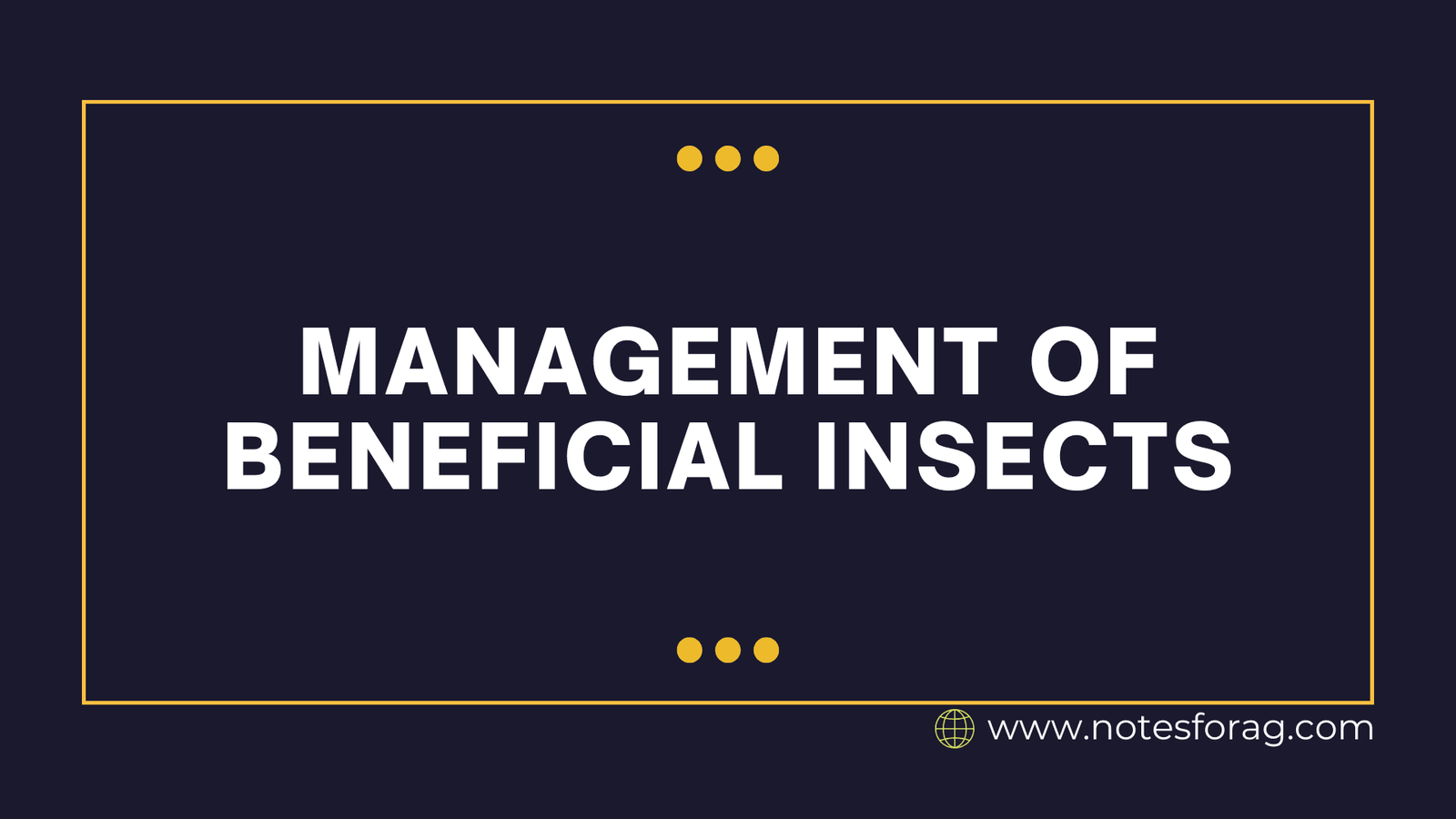Management of Beneficial Insects are essential allies in agriculture, playing significant roles in pollination, natural pest control, and soil health enhancement. These insects, including pollinators like bees and butterflies, predators like lady beetles, and decomposers like dung beetles, contribute to ecosystem services that are critical for sustainable farming and food production.
Effective management of beneficial insects focuses on conserving and enhancing their populations while minimizing practices that harm them. By providing suitable habitats, reducing pesticide use, and promoting biodiversity, farmers can harness the ecological and economic benefits these insects offer.
The management of beneficial insects is not just about enhancing agricultural productivity; it is also a key step toward building resilient ecosystems and promoting environmentally friendly farming practices. This approach supports biodiversity, reduces dependency on chemical inputs, and contributes to the sustainability of agricultural systems
Table of Contents
Objective of Management of Beneficial Insects
The Objective of Management of Beneficial Insects are:
- To increase crop yields and improve the quality of fruits, vegetables, and seeds by supporting pollinators like bees, butterflies, and moths.
- To reduce the population of harmful pests through predators (e.g., lady beetles) and parasitoids (e.g., parasitic wasps), minimizing the need for chemical pesticides.
- To preserve the diversity of beneficial insect species by maintaining habitats and ecological balance in agricultural systems.
- To encourage natural pest control mechanisms, reducing reliance on chemical pesticides and lowering the environmental and economic costs of farming.
- To utilize decomposers like dung beetles and springtails for breaking down organic matter and enhancing soil fertility and nutrient cycling.
- To build ecosystems that are better equipped to withstand environmental challenges, such as climate change and pest outbreaks.
- To provide knowledge and tools to farmers for identifying, conserving, and utilizing beneficial insects effectively in their farming practices.
Key Topics in Management of Beneficial Insects
The Key Topics in Management of Beneficial Insects are:
- Introduction to Beneficial Insects
- Definition and types of beneficial insects.
- Their roles in agriculture, ecosystems, and biodiversity conservation.
- Types of Beneficial Insects
- Pollinators: Bees, butterflies, moths, and beetles.
- Predators: Lady beetles, lacewings, and spiders.
- Parasitoids: Parasitic wasps and flies.
- Decomposers: Dung beetles and springtails.
- Ecological and Agricultural Roles
- Importance of pollination in crop production.
- Natural pest control and pest population regulation.
- Soil health improvement and organic matter decomposition.
- Conservation Strategies
- Habitat creation and preservation (e.g., planting flowering strips).
- Avoiding the destruction of natural habitats and ecosystems.
- Impact of Pesticides on Beneficial Insects
- Adverse effects of chemical pesticides on pollinators and predators.
- Strategies to minimize pesticide use through Integrated Pest Management (IPM).
- Biological Control Methods
- Use of predatory and parasitic insects to manage pest populations.
- Introduction of commercially available beneficial insects (e.g., Trichogramma spp.).
- Farming Practices to Enhance Beneficial Insects
- Organic farming methods.
- Crop rotation, intercropping, and use of cover crops.
- Promoting crop diversity to support insect populations.
- Designing Insect-Friendly Habitats
- Creating pollinator gardens, hedgerows, and wildflower strips.
- Providing nesting sites (e.g., bee hotels) and food sources.
- Monitoring and Population Management
- Techniques for identifying and tracking beneficial insect populations.
- Balancing insect populations for optimal ecological benefits.
- Economic and Environmental Benefits
- Cost savings from reduced pesticide use.
- Enhanced crop productivity and sustainability.
- Contribution to global biodiversity and ecosystem stability.
- Climate Change and Beneficial Insects
- Impact of changing climates on insect populations.
- Strategies for adaptation and resilience building.
- Farmer Education and Community Involvement
- Training programs for farmers to identify and protect beneficial insects.
- Promoting awareness of their ecological and economic importance.
- Policy and Regulation
- Policies to protect pollinators and other beneficial insects.
- International and national efforts in conservation and sustainable agriculture.
Importance of Management of Beneficial Insects
The Importance of Management of Beneficial Insects are:
- Beneficial insects like bees and butterflies are vital for pollination, which directly impacts crop yields and quality.
- Management ensures the conservation of pollinators, securing the reproduction of many plants and food crops.
- Healthy soil supports sustainable agricultural practices.
- Proper management practices protect beneficial insect species, promoting ecological balance and diversity.
- It supports the survival of other organisms in the ecosystem dependent on these insects.
- Promotes eco-friendly agricultural practices, reducing the environmental footprint of farming activities.
- Contributes to the resilience of agricultural systems in the face of climate change.
- Reduces production costs by replacing chemical pest control with natural predators.
- Improved crop yields and quality lead to higher market value and farmer profits.
- Supports stable and self-regulating ecosystems by maintaining the balance of pests and beneficial insects.
- Helps adapt agricultural systems to changing climatic conditions.
Conclusion
The effective management of beneficial insects plays a vital role in achieving sustainable agriculture. By creating and preserving natural habitats that support these helpful creatures, farmers can foster a diverse ecosystem that enhances crop health. Additionally, reducing reliance on chemical pesticides not only protects these insects but also promotes a healthier environment. Embracing practices such as organic farming allows farmers to leverage the natural pest control services that beneficial insects provide, ultimately leading to higher crop yields. Furthermore, nurturing these insects contributes to broader environmental conservation efforts and strengthens the long-term resilience of agricultural systems, ensuring a more sustainable future for both farmers and the ecosystem.
Related Articles
Farm Management, Production and Resource Economics
Protected Cultivation and secondary Agriculture

